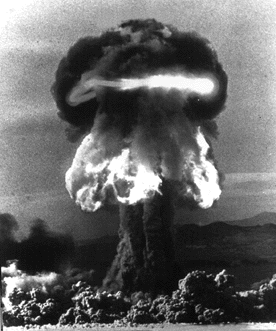Tired and aching from the journey to China, I came home early to sleep but then on second whim I decided to stay awake. Not that I am much refreshed after shower, but rather that one of the articles in Richard Feynman's "Surely You're Joking, Mr. Feynman" coated me with inexplicable sadness. That kind which blankets you about an inch away from your skin, if you know what I mean. It is not deep within you, nor is it strongly felt. It's just, there.
In case you do not know who Feynman is, he is one of the finest treasures of the human race and he is one of the great scientists recruited in Manhattan Project, the creation of atomic bomb.
Feynman is great. For me he is much greater than Einstein, Bohr, von Neumann or any other of those famous physicists or mathematicians you heard of. The thing is that, Feynman lives life as if it is an experiment, and in it he poured all kinds of imaginable chemicals and stir them up to see if there's any spark coming out. More than his science is his treatment of love. Arlene, his first wife and him. My heart breaks when he wrote about how he found his wife dead on the hospital bed after 7 years of fighting with tuberculosis.
"Arlene died a few hours after I got there ... ... Then I looked at the clock I had given her seven years before, when she had first become sick with tuberculosis. It was something which in those days was very nice: a digital clock whose numbers would change by turning around mechanically. The clock was very delicate and often stopped for one reason or another - I had to repair it from time to time - but I kept it going for all those years. Now, it had stopped once more - at 9:22, the time on the death certificate!
...
I had obviously done something to myself psychologically: Reality was so important - I had to understand what really happened to Arlene, physiologically - that I didn't cry until a number of months later, when I was in Oak Bridge. I was walking past a department store with dresses in the window, and I thought Arlene would like one of them. That was too much for me."
Apparently it was shot into a movie too. And the ending was exactly that of the last sentence. I didn't know that. I should spend some time to watch it some other day when I was not that busy. It must heartbreaking to see that moment portrayed, especially if the actors are good, and that I don't really know.
And Arlene always probed Feynman: What do you care about what the others say?
That alone kept Feynman going against his critics, achieving great success in science, only to remind himself more of Arlene when he basked in the glory of Nobel Prize.
During the Trinity atomic bomb test, everyone was given a dark goggle to wear, to protect the viewers from the bright light. Feynman was given one too, but decided to not use it because he simply could not see anything at all. He knew that the only dangerous light would be UV light, so he hid himself behind a car's glass, because UV cannot penetrate glass, and watch the atomic bomb exploded with human eyes. And I think he is right: he is the first and only person to see the atomic bomb test exploded, real-time, with human eyes.
At first he was simple exhilarated to have achieved the success, and only to see Bob Wilson the physicist who recruited him to join the project sitting in the office chair, saying: "We had built ourselves a monster, a sin." which Feynman did not understand at first.
Only then after Hiroshima and Nagasaki were eradicated did Feynman realized the complication at heart. What if where he was sitting now, the cafe at New York 6th Street, was receiving a shock wave so powerful that all glasses were shattered, his body thrown away like a dust and when the rays of a thousand sun burning engulfs him, everything is lost forever?
Would life ever be the same again? Would he join the Manhattan Project cause again? He didn't have an answer too.
In fact these kind of situations were so hard that even the facts themselves made us crimped:
1) Population growth is simply draining our earth resources;
2) More oil reserves used means a much more destroyed planet which could not possibly be savored if we continue to burn them in the coming 25 years.
If you extrapolate that, lower birth rate is actually a good sign. Stalling economies mean that the world will be forced to spend less resources, thus preserve a good balance. What I know now is we are in such a desperate situation today, the world would do much better by cutting half of the total population. If you start to take a gun and shoot people on the street, human will punish you in jail or sentence you to death, but the Mother Nature in fact would probably be sighing in relief.
We celebrate life but we are disgusted and recoiled when we are told that death of a lot of human is actually necessary to preserve balance. Like what Isaac Asimov said, everything human builds, moral values and ethics and religious belief all in all, this will all simply crumble when human population exploded into uncontrollable scale which simply depletes all but a few resources on Earth.
When that moment arrives, there is no God. Or it's like in the Bible, the Heaven and Earth joins. We will all simply meet our ends at the same time after we single-handedly destroy our own ecosystem. That, would be the cruel Judgment Day.



No comments:
Post a Comment